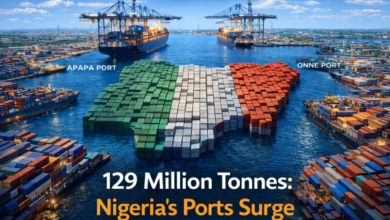Shifting Gear To The Blue Economy – Part 1

The current administration at the Nigerian Maritime Administration and Safety Agency (NIMASA) came into office with a three-point agenda, or ‘Triple S’ programme of maritime security, maritime safety and shipping development. Total security has not yet been achieved, but to a large extent, there has been a noticeable reduction in the rate of piracy and other forms of criminality in the Nigerian maritime environment, from the beginning of this year. This is a fact that is attested to by the International Maritime Organization (IMO), especially as reflected by the International Maritime Bureau’s (IMB) July 2021 report that piracy in the Gulf of Guinea is at its lowest in 27 years.
Having succeeded in partnership with the Nigerian Navy and other security agencies in the Deep Blue project in reducing crime rate and achieving a reasonable level of safety in the country’s waterways, NIMASA is shifting attention to another statutory responsibility of creating the conducive environment that is necessary to usher in a new era of economic growth through a thriving Blue Economy. This is going to be achieved through the instrumentality of three legislations, namely: The Merchant Shipping Act, the Cabotage Act and the NIMASA Act.
This project, another initiative of NIMASA, will be operated under the umbrella of the Littoral States Cooperation of Nigeria (LISCON), and will serve as a vehicle for the strategic exploration of the country’s assets in the entire maritime environment. The need for a platform of this nature stems from the fact that while focus has for a long time been on oil and gas, there’s a lot that lies deep inside Nigeria’s belly, on land and in the sea, waiting to be discovered and tapped for economic use. These include minerals, plant life, fish and aquatic animals.
The platform would enable cooperation involving NIMASA and the littoral states for the purpose of regularly comparing notes and engaging in peer review, as well as support systems that are mutually beneficial. The benefits are quite enormous, including achievement of the collective nautical aspirations, sea economics and general governance of the maritime environment.
READ ALSO:https://brandeconomy.com.ng/nimasa-partners-edo-for-capacity-development/
Littoral states feel the immediate positive and negative impact of the activities that take place in the maritime environment on a daily basis. This is especially from an international perspective, such as ocean surges, rising of the sea level, pollution (from oil exploration and production activities), etc. It is therefore of strategic importance that they should act as the engine room for fast-tracking the development of the country’s maritime domain for the purpose of exploiting its enormous potential for the good of the country. This kind of cooperation with NIMASA is also necessary to enable the country to optimally benefit from international maritime business through the Gulf of Guinea, considering that the country accounts for more than 70 percent of the trade that takes place in the region.
The cooperation would see NIMASA designing and executing projects in each of the littoral states, which benefit not just the communities and states, but the country as a whole. For instance, there is a partnership involving NIMASA, the Nigerian Railway Corporation, the Bayelsa State Government and NALEDI Foundry, a South African technical consultant, for the revitalization of an old foundry in the premises of the railway corporation for the purpose of recycling relics and wrecks for the economic benefit of the country. This project, which is designed to turn waste into wealth, is expected to yield the economic benefits of revenue for the federal government, job creation for the youths and enhancement of technological know-how and expertise of Nigerians in the most modern method of recycling of wrecks. The Nigerian Railway Corporation is expected to provide the premises for the project, NALEDI Foundry the technical assistance, while NIMASA and the Bayelsa State Government are to provide counterpart funding.
The cooperation will also see intervention by way of support for the rehabilitation of the Ayetoro Technical Institute, one of Nigeria’s foremost maritime engineering schools, which has suffered many years of abandonment, in Ondo State. The objective is to help boost the training capacity and manpower development for Nigeria’s maritime industry. Another area of intervention is the plan to provide overseas educational sponsorships for the training of at least 10 cadets from each of the littoral states in fields such as marine engineering, oceanography, nautical science to enable them become fully developed sea bound professionals thus expanding and deepening the nation’s maritime capacity.
In the coming months, each of the littoral states will receive its own share of joint collaboration interventions that would all be geared towards achieving the objective of fully exploiting the resources that abound in Nigeria’s coastal areas for the economic benefits of the country.

• Dr. Jamoh is Director-General and Chief Executive Officer of the Nigerian Maritime Administration and Safety Agency (NIMASA).
Source: The Guardian











